BookExpo America - 2015
Posted on June 19, 2015
(Editorial assistance provided by Mayapriya Long and Alice Walker.)
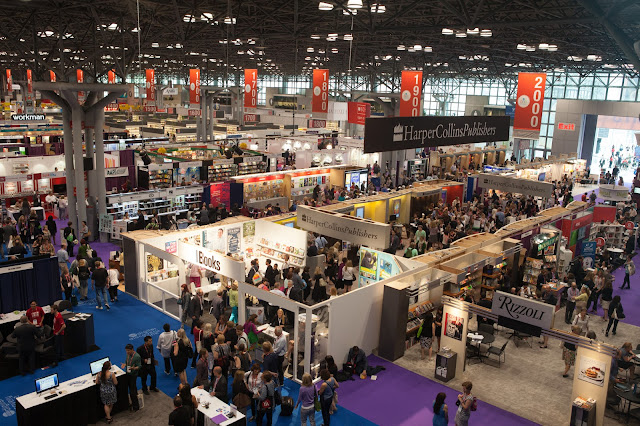
The free BEA bus from the (fashionable) East side took about an hour to get cross town to the hall, but it was OK. The anticipation of the first day is always enjoyable... sort of like on a first date!
When the bus pulled up, we all piled out, expecting to have to elbow our way up the stairs and onto the line past the badge-checkers to enter the exhibit area.
But as soon as we walked into the show, everyone noticed something different from previous shows: space... both more AND less of it. It was unmistakable. It was totally obvious. This year there was less booth space sold... and there was a lot more elbow space in the booths that were!
* * *
There is a specter haunting the publishing world and more specifically this year’s BEA, the specter of irrelevance. For those of you who do not believe in ghosts, a visit to this year’s annual book show at the New York City Javits Convention Center would probably convince you otherwise; as this show was a ‘ghost’ of its former self.
The good people at Reed Exhibitions put on a great trade event, and being someone who has a lot of experience in going to shows and writing about them (see Adams-Blake Publishing,) I know a ghost when it is staring back at me. Reed is the BMW and Mercedes Benz of the trade show impresarios but there are only so many ways to make a hall seem ‘filled’ when the space is not sold.
If BEA 2015 was not half the size of former events it seemed as such. The space-planners at Reed performed as much magic as they could in making the hall seem larger than it was, but everyone and their Amazon-hating dog knew it was smoke and mirrors.
Making the autograph area larger and adding many more lounge-seating areas and food vendors in the middle areas helped fill the room, or at least give the appearance of it being filled. However, there was still a lot of space roped off with yellow curtains.
One quick look and it was easy to tell that many of the large houses bought less space this year. Usually some large publishing entity takes "center stage," the area front-and-center, which is the most expensive.
So who bought the high-priced real estate?
We all know that the best way to sell something expensive is to sell it to someone who is not using their own money to pay for it. In the book world whom might that be? The answer is foreign governments.
This year it looked as if one half of the space was sold to the embassies of wealthy Middle Eastern Arab oil states, European countries, and Asian governments.

There were more European countries represented this year, and Italy bought a lot of space and had a nice booth.
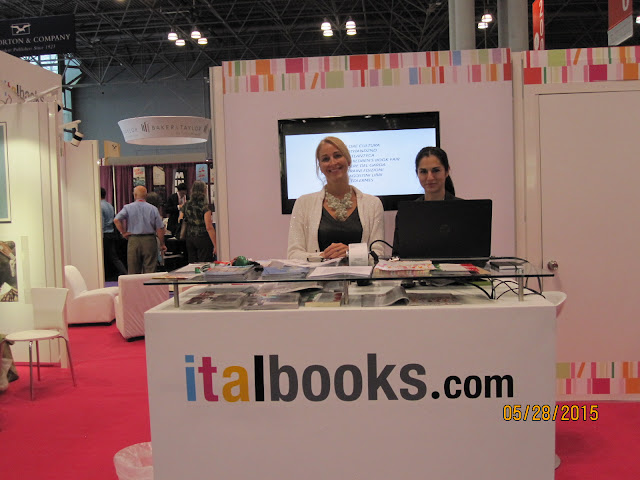
And then there was Turkey which was the first time I’ve ever seen them exhibit. They had a lovely booth with beautiful books. However I never saw anyone in the booth to greet visitors.
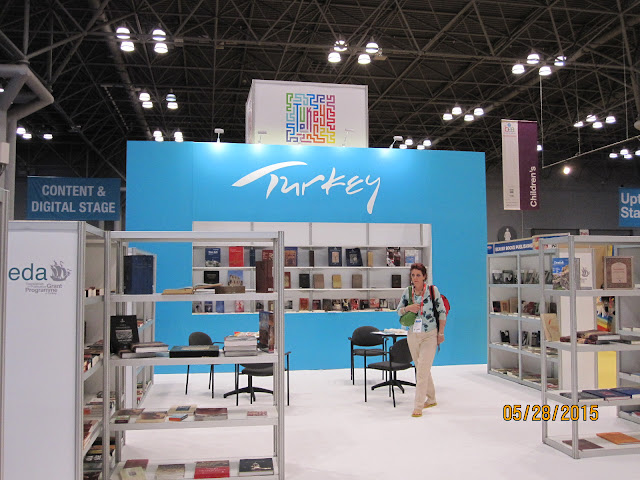
Another country that I had never seen before was Armenia. I have no idea what the Armenian reading population in the US is, but I suppose it must be substantial enough for them to travel to the show. The booth had no traffic when I was there and she would have shown me every book she brought if I had the time!
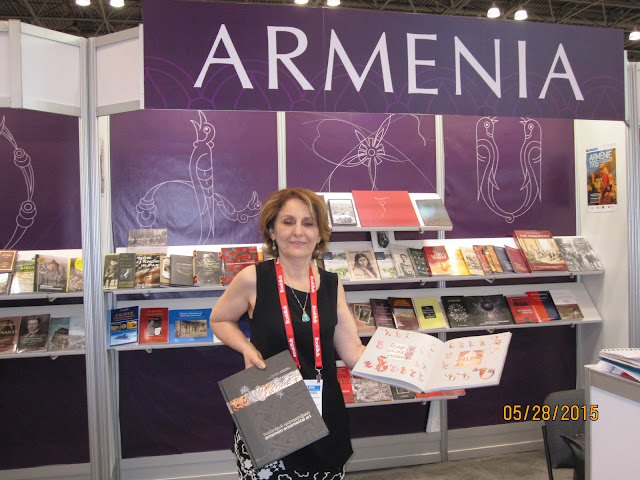
Finally there was China.
Honestly, it looked like China had bought 30% of the hall. I’m sure it was less, but that was the impression. They had a series of interconnected booths with furnishing that spared no expense... along with what looked like a booth-staff of over a hundred.

It looked like China was trying to make some political statements. I spoke with some of their press people and they know the bad rep they have in the USA for censorship of the Internet.
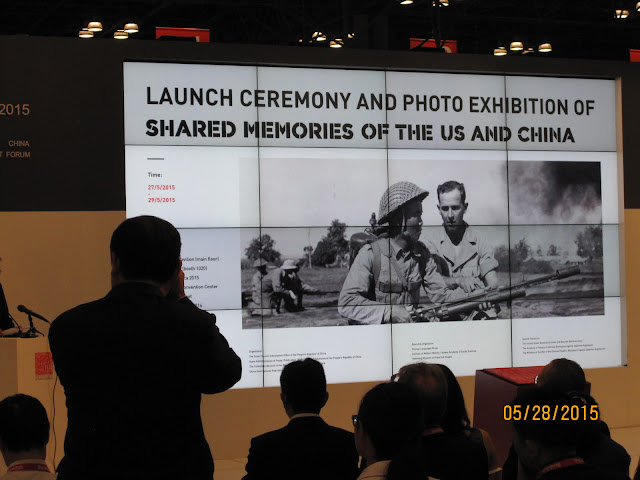
I’m trying to impress upon you just how large the China presence was. It was HUGE compared to any other country, or publisher. If it was not one-third of the hall, it sure looked like it.
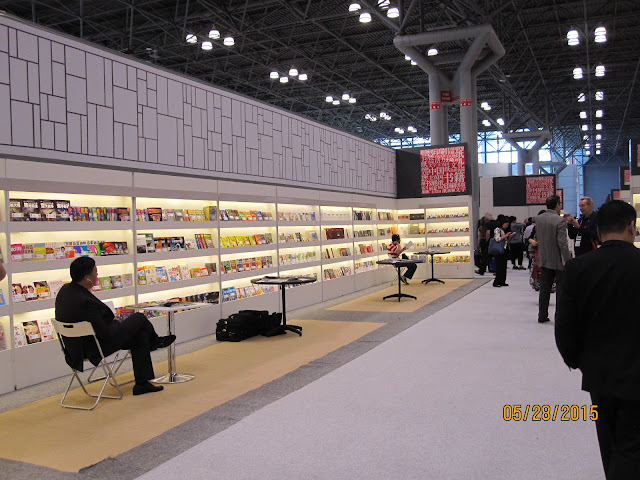
If there was one book that stood out, it was this one that came in a bunch of different languages. It looked like propaganda to me, but I’m hardly an expert on the politics and government of China. I do know a lot about Chinese food!
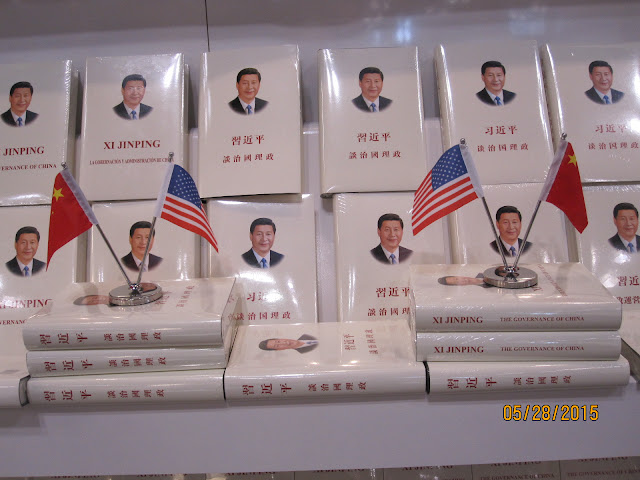
The usual suspects were present from the large press, but the size of most of their exhibits was scaled down from previous years. It was the same with the large vendors like Bowker and Ingram which took less space and had fewer people this year; and many of the tech companies like Book Baby who had large spaces last year were not to be seen this year.
It was a two and a half day show, but it could easily been seen in a day and a quarter. And this year it opened with a half day. What was that all about? People told me that they were not going to schlep from their posh hotels on the East side all the way cross-town over to the West side (Javits Center) for just a few hours. For the life of me I can’t figure out what Reed was thinking by opening the show in the afternoon and I (and a lot of others I spoke with) would advise them not to do it again.
Another ghost of the past was the small press. In previous shows the small press was relegated to the “Outer Mongolia” of the hall… way off on the far-right (geographically, not politically!) side of the hall. But at least for their money they got real booths… you know with signage, drapes, a long table, chairs, etc.
Not this year. For about $3000 they got a small table (and I do mean small... like in TV tray small!) in the central area of the hall. Think of a park with lots of small picnic tables all in a row. And many of these micro-booths were shared! I think the tray-table on the Delta flight that I’m writing this electronic fish-wrap on now is larger than what these small publishers had in order to show their books! Yes, the location was terrific and the traffic was increased, but these were so small that it was difficult for anyone with more than one or two books to show their list.
Again this year there was the “DZ” or Digital Zone where Reed put these cute little kiosk booths, most of them from Indian firms doing e-book conversions and content-enhancement.
For an obviously smaller show, except for the too-tiny small press mico-tables, the show-floor was well designed. But then again, no one can create a show floor plan as well as the talented people at Reed.
I think Reed and their publicity partners did a great job publicizing the show. There were tons of pre-show press releases to the media, they had an excellent mobile app with all sorts of helpful functions, and I'm positive that everyone in the industry knew when and where the BEA was (which was not hard since it has been in the same place the past six years!)
So where was the traffic?
I simply don't know.
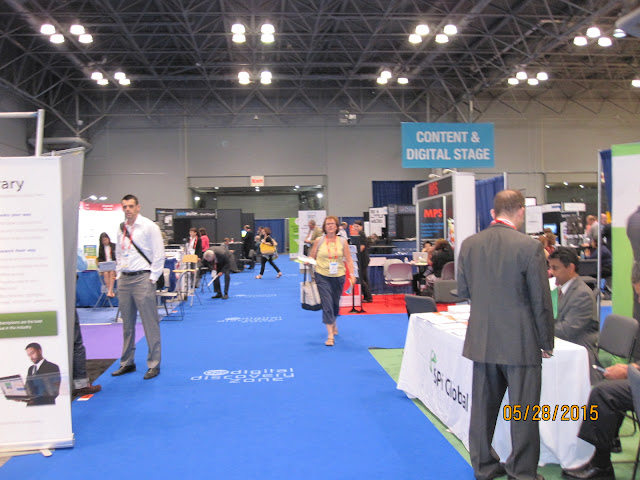
Every trade-show on the planet spins their numbers and inflates the attendee count by some percentage or another. Some include booth staff, security staff, vendor staff, or they use the number of tickets ordered, not actually picked up etc. Many shows will scan a badge each time it enters the exhibit hall, so if someone goes in, then comes out to go to lunch and then goes back in, they count it as two visitors! (If it is a 3-day show as someone does that each day, they record it as six visitors!)
Reed tends to be more conservative in their numbers than other trade show organizers, but since they did not scan badges this year, they won’t have an accurate count of ‘hits’ so to speak.
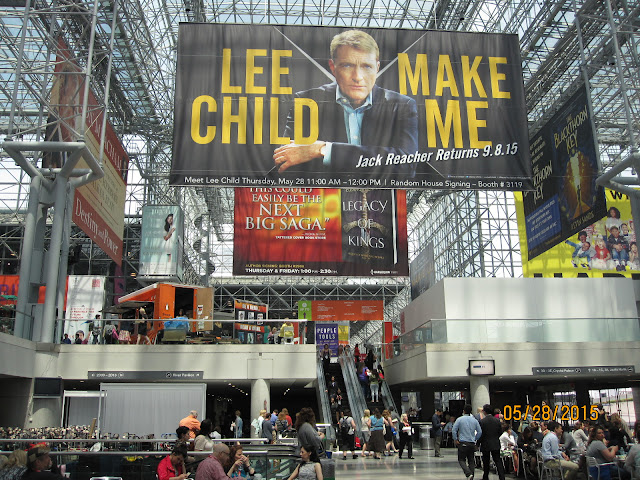
I’ve not seen any published figures yet, but this was the least visited BEA I’ve ever been to, and this was my 19th show in a row. There were parts of the hall (especially in the DZ) where the booth attendants were actually asleep because they had no visitors.

Anyway, the number of attendees is not important. If you get one visitor to your booth who either buys your entire inventory (i.e. enough to pay for your booth and the trip) or they get you on a segment of Oprah or 60 Minutes or Today, the show is a worthwhile investment.
In the past there were tons of ‘blue badges’ (badge-color denoted if you were a buyer or a vendor or press or exhibitor. The non-buyer colors changed from year to year but buyers were always blue.) Every bookstore in the nation used to send someone to BEA (which used to be called ABA) to buy the year’s inventory. Now there are two buyers… Barnes & Noble, and Amazon… and I didn’t see a rep from either one at the show!
There were a fair number of librarians from the NY metro area, but we all know what library budgets are these days… and most of these wonderful people that I saw were waiting on line to get signed (free) copies of whatever was being given away by the major houses.
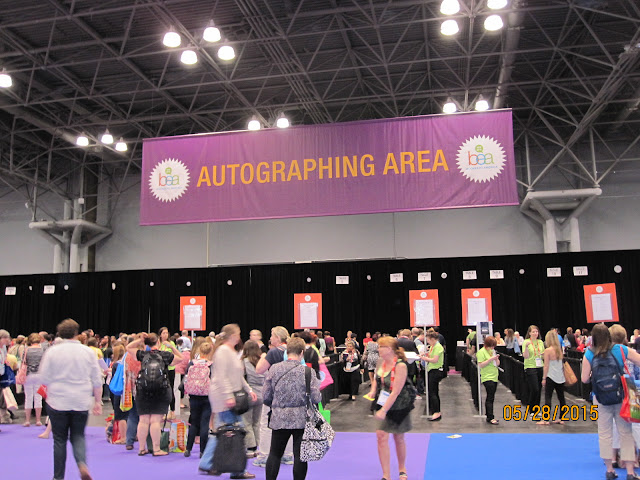
While there was more traffic at the booths of the large publishers, especially those giving away free books or totes, it was nothing quite like previous years when you had to fight your way through the aisle.
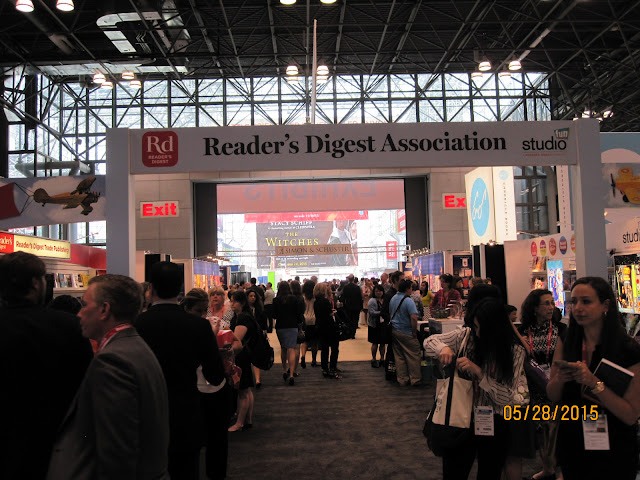
Bottom line, there just was not as much excitement at this show as I’ve seen in previous years. It was painfully obvious that the enthusiasm that large publishers have had for BEA has waned… many of them bought far less space and obviously showed fewer books.
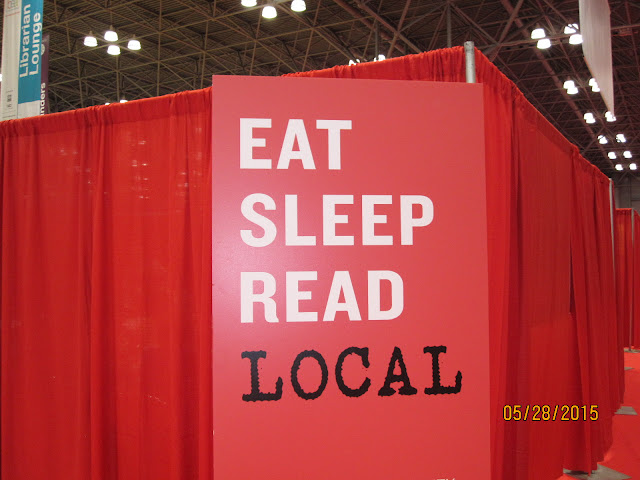
* * *
There used to be lots and lots of parties. Not so much anymore. In the past there were two really great parties… both of them award ceremonies… the IBPA Ben Franklin Awards and the IPPY Awards. The IBPA basically pulled out of BEA and now holds their own show, this past year it was in Austin, TX.
However, the IPPY Awards are still held during BEA and it is easily the party everyone wants to go to, but only 300 can (as that is the max allowed in the building and so it is by invitation only.)
Jerry Jenkins owns the company that does the IPPY and he knows how to throw a great party. The past six years it has been held in a large two-floor night club on 8th Avenue and 57th called the Providence.
And no IPPY party would be complete without seeing Jerry with a knockout book-babe on his (very married) arm.
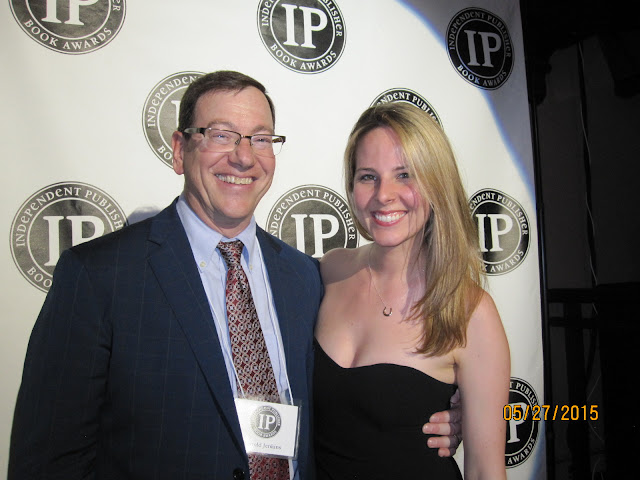
Standing on the second floor (actually a mezzanine) you get to see all of the action on the floor below where Jim Barnes announces the winners. Note, the winners know in advance that they won which is why they spend the money to come to NY to accept.
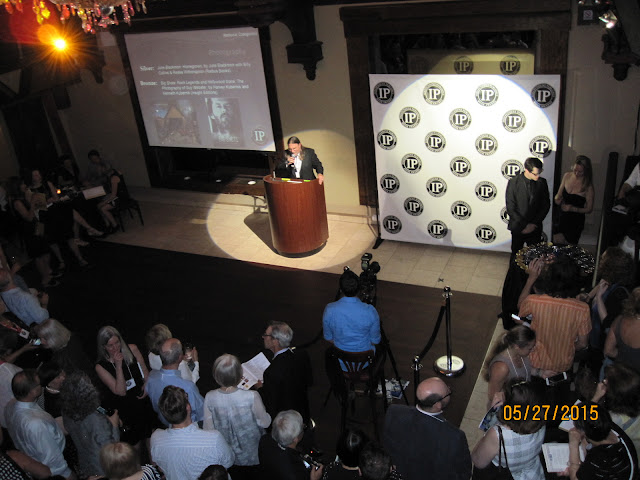
Jerry told me that he received around 6,000 entries for all of his award programs which is way more than any other award program that I know of. In my opinion the IPPY Award has surpassed the Ben Franklin award in prestige and stature, perhaps because the competition pool is larger than the 1500 or so entries that IBPA gets for their award.
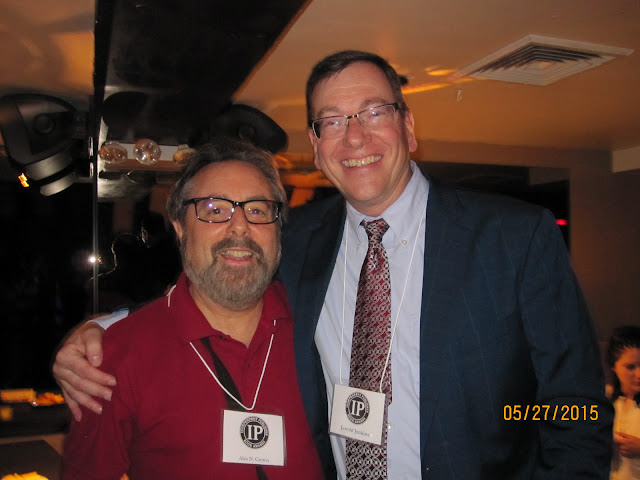
* * *
When I first entered the exhibit hall I stopped at the IBPA booth. What a huge change. In past years IBPA would buy up a couple of aisles of space (at a discount,) carve them up, and re-sell standard 10x10 booths to its members for about $4,000 giving the buyer a prime location that was sure to get traffic. In the past there would be upward to 20 of these booths, giving IBPA a nice little profit.
Not this year. I don’t think they sold more than five or six booths, maybe not even that many.
And in the main IBPA area there used to be 30 or 40 feet of shelving where IBPA was being paid to exhibit books for their members (for a modest fee.) The concept is that buyers would browse and contact the publishers for more info (or buy from Ingram) Again, not this year. There were only a few shelves... a far cry from ghosts of BEA past!
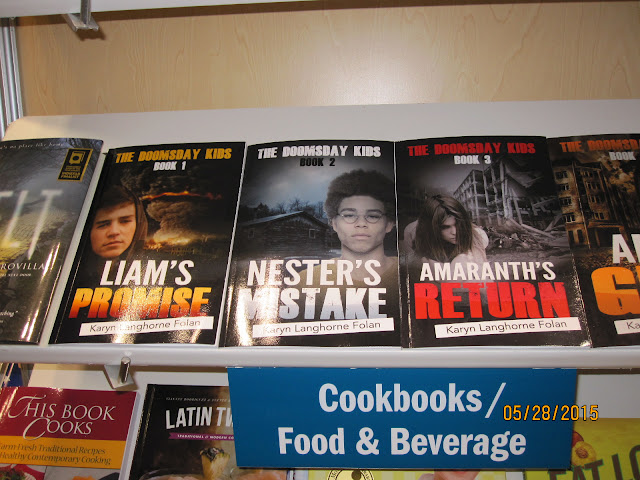
I always like to cover the sidelines because it gives me an idea as to what direction the remaining retailers are going toward (since most sell other things besides books these days.) It was impossible to tell this year because there are very few new sideline vendors. But one that I found is Ogosport which has a popular bunch of build-it characters.
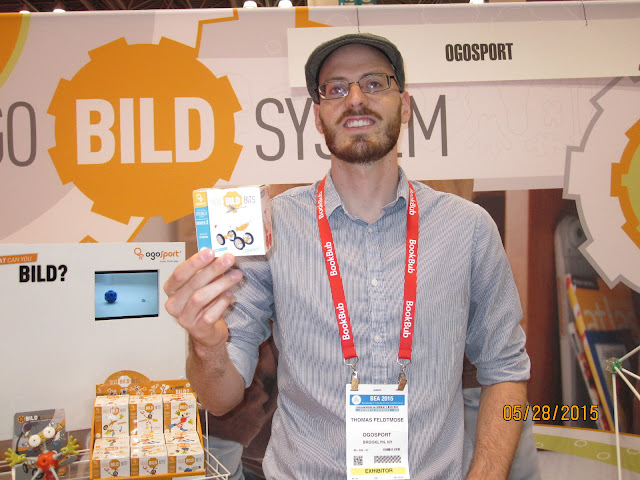
Every BEA has a vendor for reading glasses, but most of them are more boring than Jeb Bush (and that's pretty boring!) But 2020 Vision USA has frames that are just downright cool. If I could wear readers I'd have a bunch of these.
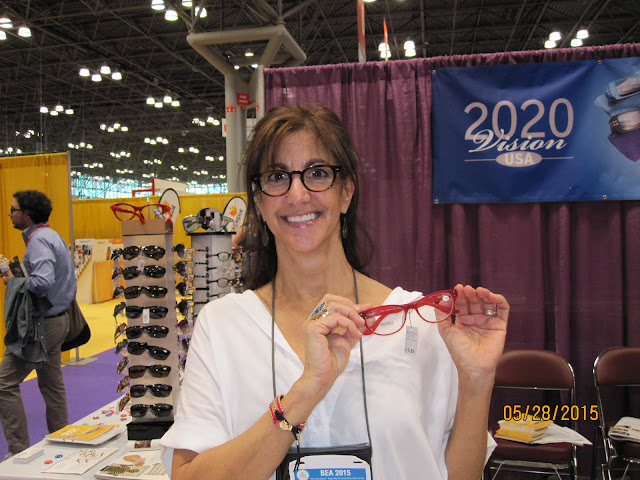
Years ago we had numerous G/L as well as 'alternative lifestyle' presses that came to the show, often bringing what were then 'shocking' books. But we don't see too many anymore, maybe because the 'shock' has passed and it's all mainstream now? I don't know, but the German publisher Bruno Gmunder brought a few of their tomes which I thought looked interesting.
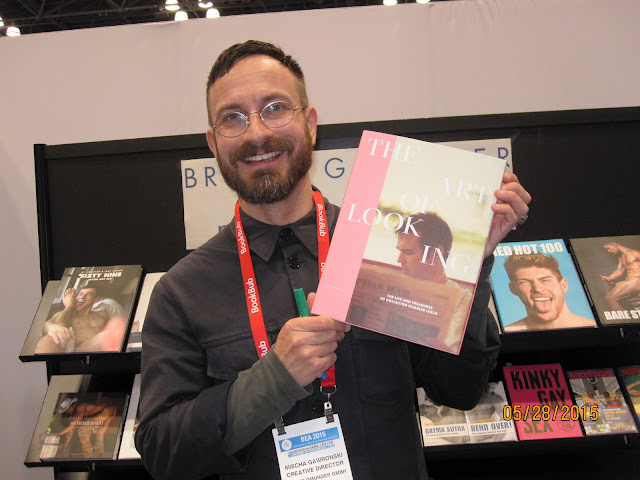
This year there were still a bunch authors who came to hawk their own books. Nely Cab is just such an author and while I don't know much about her genre, I thought that her books were so totally professional that they looked better than most tomes from the large houses with unlimited budgets who publish in this genre.

Many books I simply don't understand. But they have great covers making me think that there must be something inside them. The blurb for Creation is: "The entirety of the world’s art and invention has been inspired by a corrupted muse, who has implanted a series of codes within the works of history’s most influential authors, warning of humanity’s end and a new dawn of time."
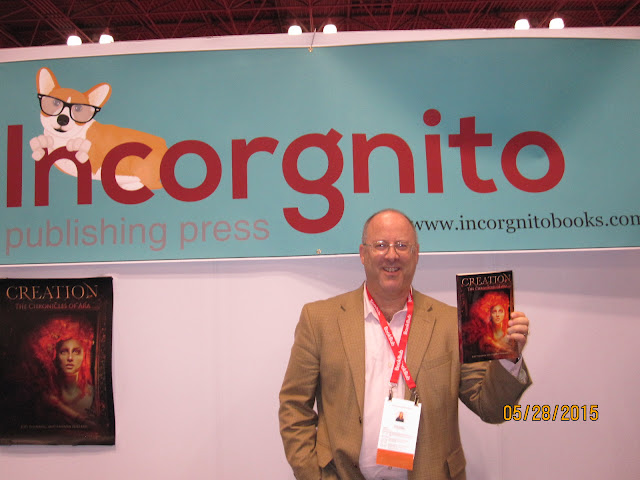
In the middle of the small press section was the perennial booth of one of the foremost publicity agencies in the lit biz... Smith Publicity. They claim to be the "most experienced book marketing and book promotion agency in the industry." I don't know if that is just a bit of hype, (from a publicity agency? I'm shocked!) But I've always heard good things about them so my guess is that they are what they say they are.
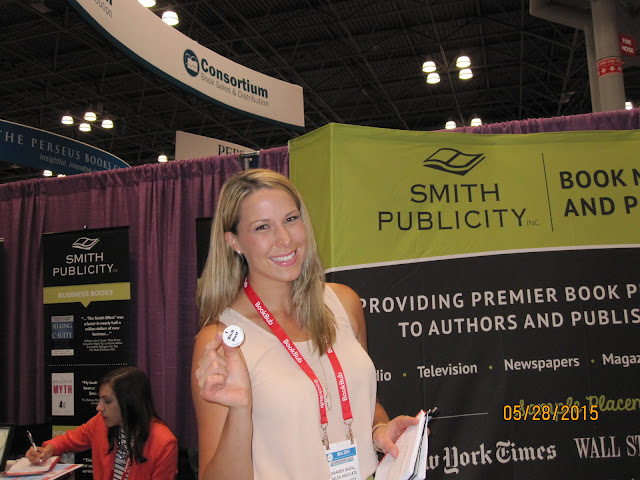
There is one and only one really great magazine about books in this industry and that is Foreword. One of their divisions is Foreword Reviews, where publishers can pay to have a book professionally reviewed. Years ago when this concept was first floated, there was outrage. But they stuck with it and now paid reviews are mainstream in the industry.
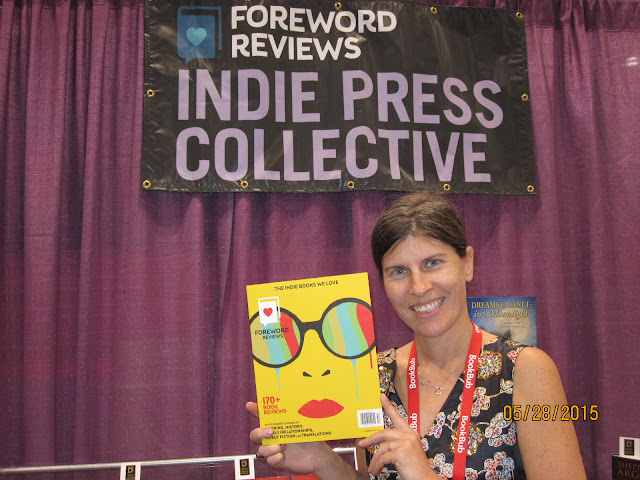
Each year there are a couple of aisles filled with remainder sellers. There are hardly ever anyone viewing those booths but each year the sellers keep coming back so I assume that they all must make a lot of sales. And the profits margins in a used bookstore is far better than a new one. Most new books get a 40% markup. But a used book can get a 100% to 400% markup... which is why you still see lots of used bookstores around. Buy for dollar and sell for three? Not bad!
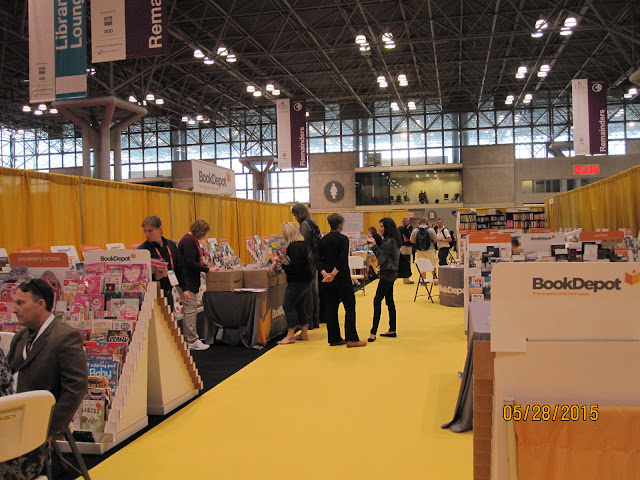
I remember years ago when there were tons of characters in costume. It's a sure-fire publicity-getter but for some reason it isn't done much anymore. Maybe everyone feels too sophisticated. It's too bad because lots of kookie costumes add a lot of fun to a show. This year, the only one I saw was from the Dummies people.
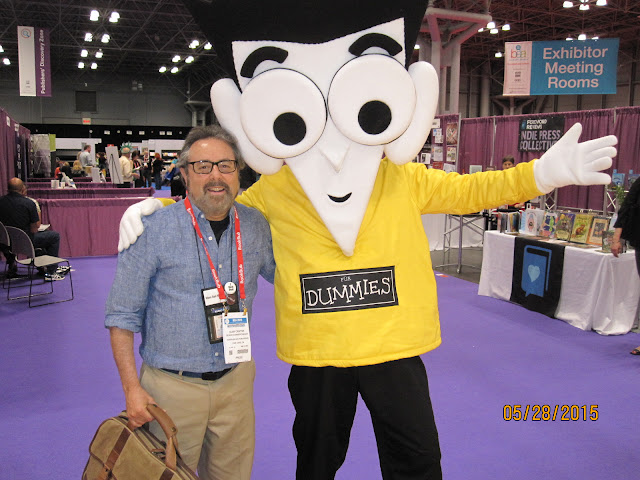
One of my oldest friends in the business is the owner of Stone Bridge Press which has always done books on or about Japan and Japanese topics. They had not exhibited at BEA for many years but this year they exhibited through their distributor. I was hoping to see Peter Goodman, but he didn't come. They have a new imprint called ThreeL Media, (which are Love, Live, and Learn.)
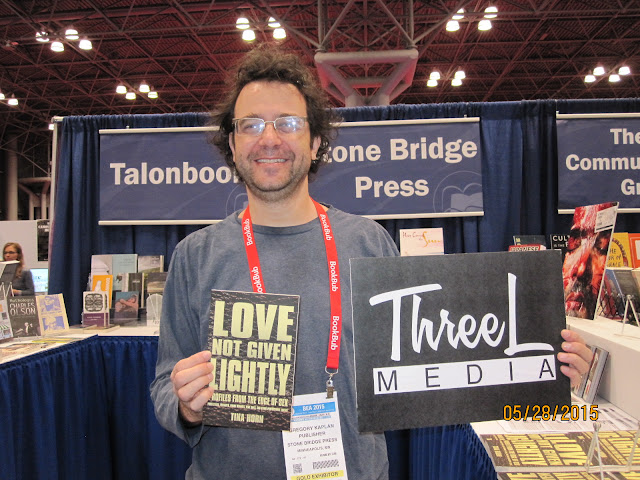
Coach House Books is a fairly good-sized "literary" publisher out of Canada with a list of somewhat eclectic titles. There was something about this title that just caught my interest: "A bet between the gods Hermes and Apollo leads them to grant human consciousness and language to a group of dogs overnighting at a Toronto veterinary clinic. Suddenly capable of more complex thought, the pack is torn between those who resist the new ways of thinking, preferring the old 'dog' ways, and those who embrace the change." It's rather interesting to me.... YMMV.
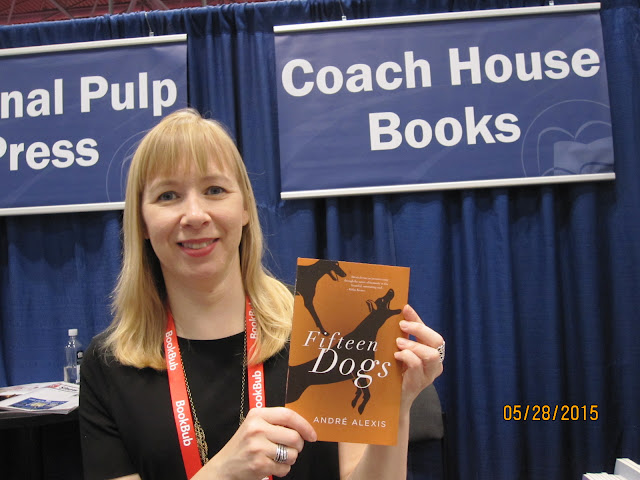
There is a young woman... well she was younger when I was too.... who started at the bottom with Da Capo Press in Boston and has worked her way up the food-chain to VP and Acquiring Editor. I have no doubt that one day she will run her parent company Perseus Books, who also own a number of other publishing enterprises. This year she thinks "vegan" is in! If I were a large company looking for someone to run it, Lissa would be first on my list. (And yes, she is older than she looks!)
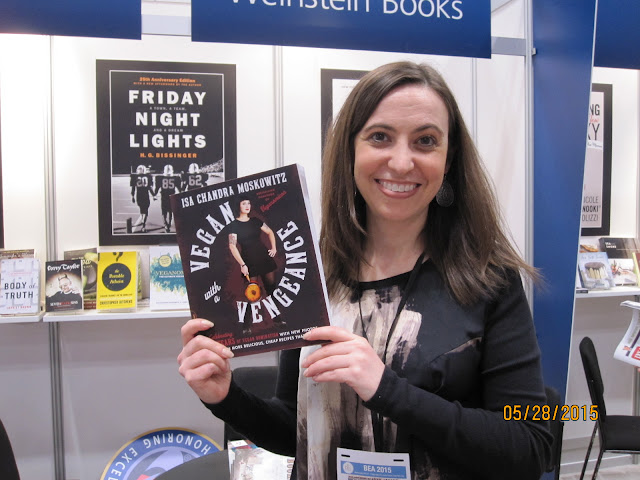
One area where there didn't seem to be a shortage of entries was the children's section. Many of the same publishers were there... with the same books. Most years there are a few publishers who come along and believe they have the next 'disney' character. Most never come back, but one that I thought might have a shot is Tails of Whimsy.
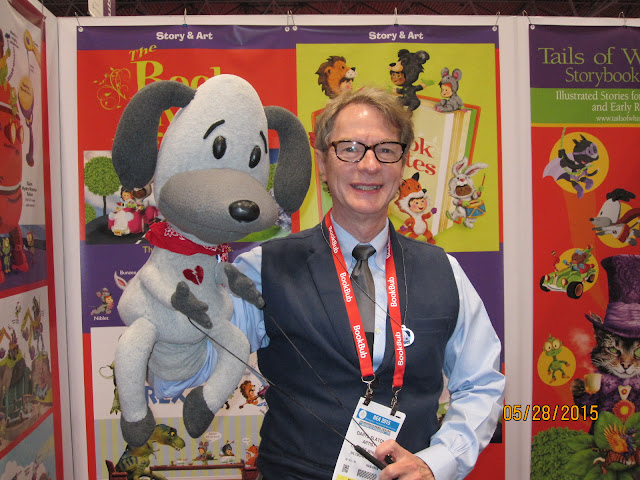
I think it is smart to publish to market segments, and I've always thought it smart to publish in the religious sector. Believers buy books! Ann Koffsky was in the Apples and Honey Press booth showing off her fun Judaica books. Their blurb: "Apples & Honey Press brings together the best authors and illustrators from North America and Israel to create memorable stories for children that illuminate the values of family, community, having fun, and being the best we can be."
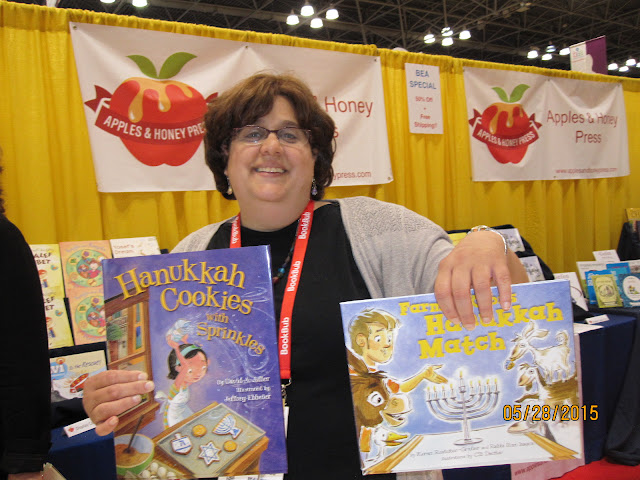
With kid books you just never know what people will buy... and there is nothing that can be too weird or strange in that genre. Sometimes I think the weirder and stranger the topic is the better it will sell! Anyway, I thought Tug And The Tooth was about the weirdest and strangest book I saw at the show, so it would not surprise me if it becomes a hit.
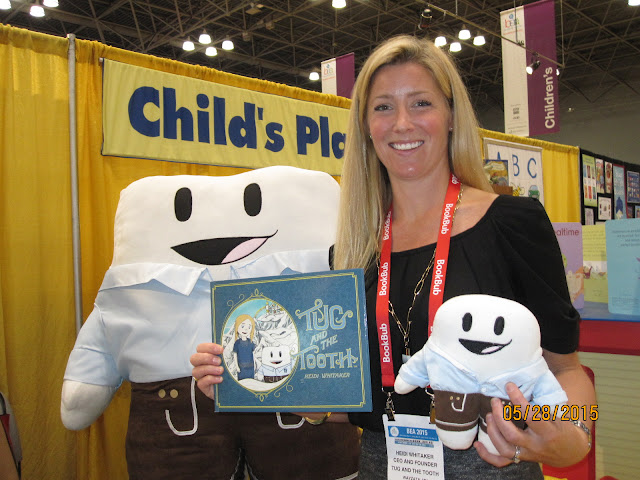
For what is called the middle-grade-child segment (grades 3-5,) the one publisher that I think has breakthrough potential is Connective Arts with their inspiring McLittles collection. There is enduring and endearing story-power here and it's the kind of thing that could get picked up by a Disney or Hallmark. I think McLittles has a shot. It's nice to see good quality stories directed at the elementary school market.
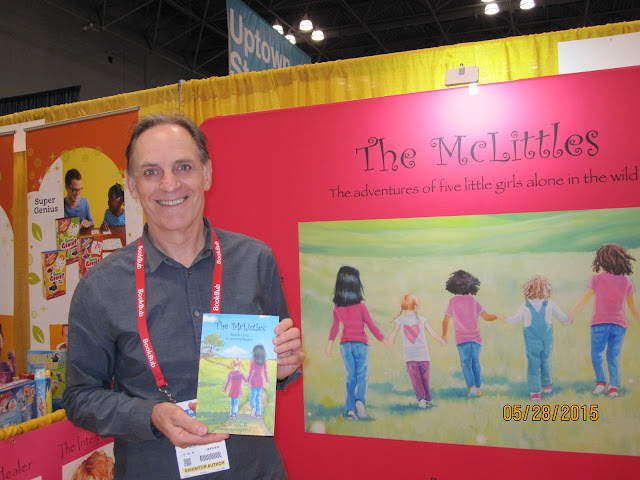
Almost every show has a booth with some musical talent, and this year was no different. There is a company called Little Scholar that makes an iPad-like tablet targeted to young readers, and a well-known singer Brian Vander Ark (from The Verve Pipe) is involved with it. I enjoyed listening to him.
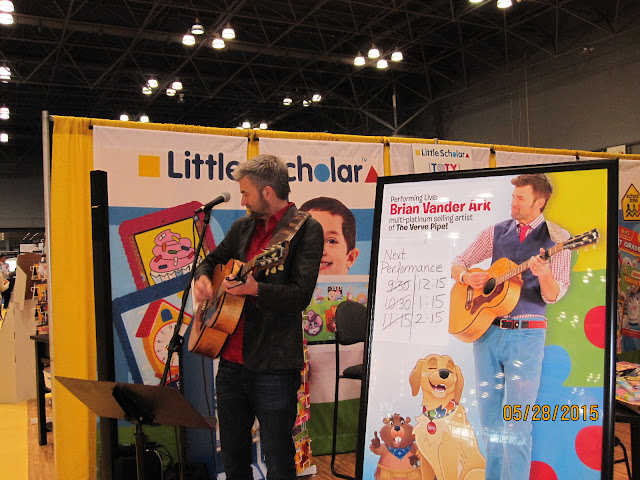
In the small press "pod" area (the small tables I mentioned earlier) was an interesting service I've never seen offered at BEA before. This is BookHive. "BookHive offers online focus group research for authors who want to test finished manuscripts in target markets. Both quantitative and qualitative online research are conducted via carefully selected members of the targeted readership. Test readers review finished manuscripts and give honest feedback. Results are available to the author to provide useful information for editing the book. Favorable test results can be a powerful tool for promoting the book to agents and publishers--as well as the general public, if self publishing is contemplated." Market research before you publish. What a concept!!
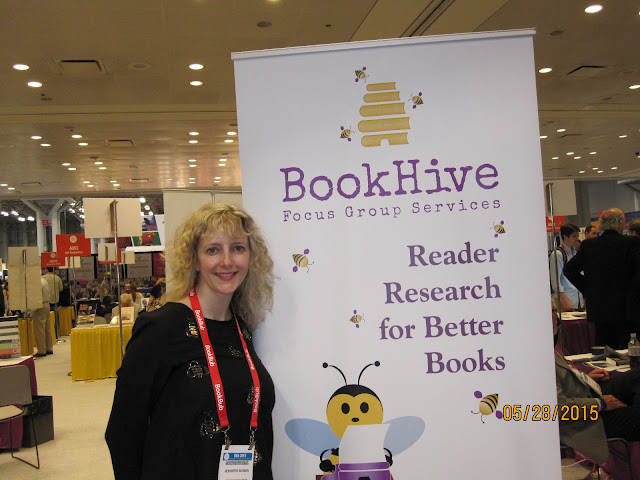
I talked to Kathy Ann Meis at Bublish. When I spoke to her what she said sounded like a good idea. But when I got to her website (bublish.com,) after forgetting what she had told me, I could not figure out what the program is. It sounds like a good idea, but I'm at a loss to explain it. Take a look and maybe her program will work to help sell your book. It might be worth a shot.
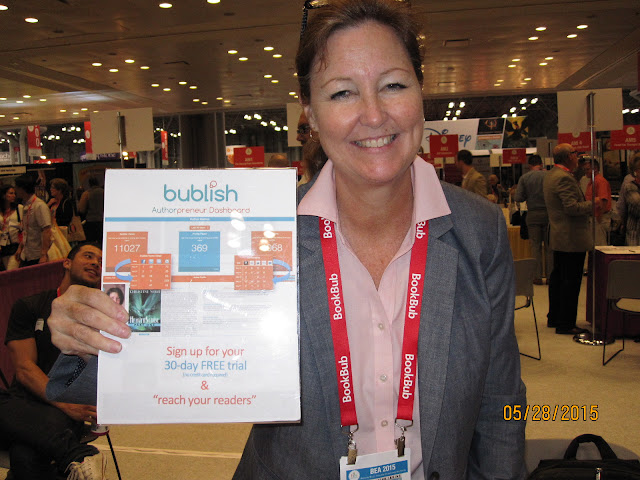
Some things are just silly enough to sell and apparently Santa Clops has done just that for several years. I'd never heard of it. "It's a monstrous take on the holiday classic The Night Before Christmas. In this new adaptation, Santa Clops, the beastly one-eyed cousin of Kris Kringle, stops by a slumbering family's house on Christmas Eve to put some coal in the stockings of the children that live there." I got a smile out of it.
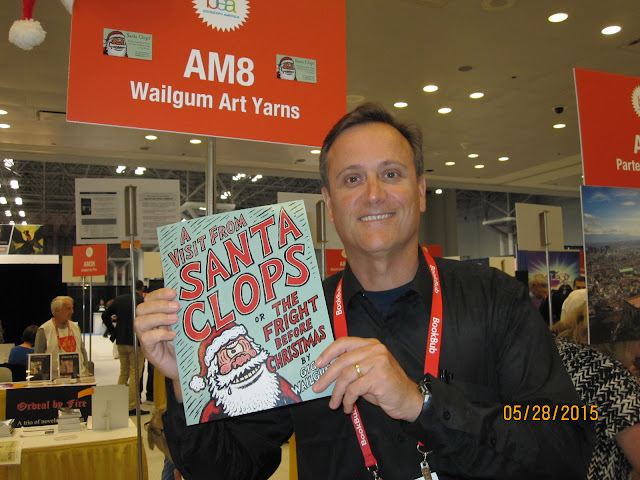
Some publishers just get it altogether... the right story, the right character, the right market and the right strategy to become an acquisition target. I hung out for a while at the Madison K booth and watched as reps from major house after major house came by to see if they could acquire not only Nina Kaplan's books but her entire line of products as well. I didn't stay long enough to see if anyone made the deal.
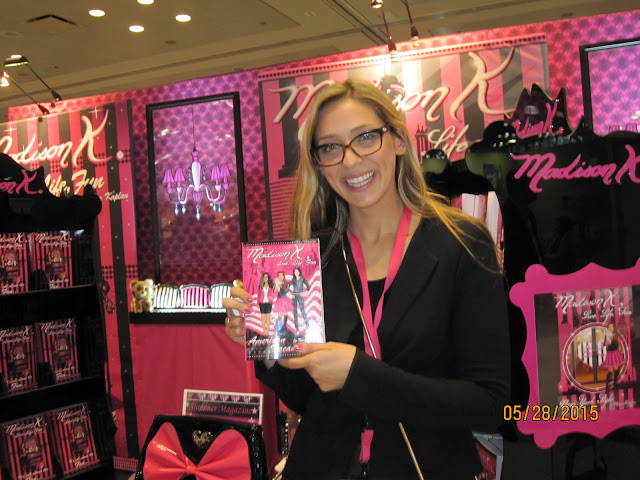
Finally, I found what I thought was the most creative publisher at the show. Actually, they are more designer than publisher, but since they were at a publishing show I guess they are publishers. Their books and designs and products are just so.... unique (in a good way!) that in my opinion they win the "Best in Show" award. Take a look at Obvious State. You will understand why I think they are so good.
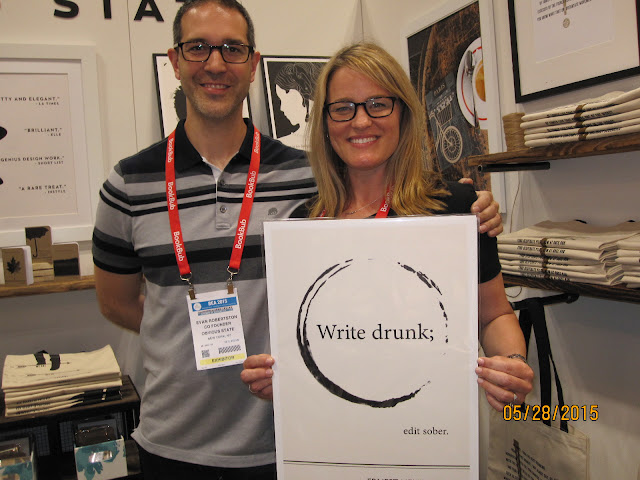
* * *
OK, so the show was not as large as it used to be and to my count it was not as well-attended as in years past. But it was still a good show. Reed did an excellent job, per usual, both in running the show and publicizing it.
The issue, (i.e. specter) facing the BEA as well as the entire industry is relevance. Where are books in relation to the rest of the media? When it's easier to make a video and takes less time to consume it, is the written word still a viable means of communication?
I instinctively say 'yes' but young people whose total reading ability is 140 characters of a Twitter post, often say 'no.'
I love books, book fairs and trade shows, and the BookExpo in particular. But as each year goes by I'm at more of a loss to explain just how a show is relevant to each of the players... the publishers, the authors, the middle channel, and the retailers.
The 'rationalization' I hear from other show reviewers (like Jael McHenry) is that it is now all about making 'relationships' with the other players. I want to believe that, but I'm having a hard time substantiating it.
I think shows like the BEA are just fun. That's right. Fun. And in a highly profitable industry, people and companies will pay for fun. But publishing, for most of us, is not a high-margin business any longer.
There is an abundance of product and a shortage of consumers of said product.
And why is that?
I think it is simple.
We sell books when we ought to be selling reading.
Hollywood never sold the story... they sold the romance and the adventure of going to the theatre and escaping from real life for a few hours (as well as sex in the dark.)
Theme parks don't sell rides... they sell an 'experience' and 'adventure' and even 'danger.'
Cruise ships don't sell clean air and rest and relaxation, they sell luxury and gourmet food.
But we're still selling story-lines, plots, characters, and information, when we need to be selling reading as an experience, adventure, and escape.
Take away the 'fun' of BEA and what is left? It's not sales. And judging by the few press creds that I saw, it's not publicity.
No one is buying anything anymore. It's become a "look what we're doing now" kind of show... and while there is nothing wrong with this, I fail to see how the corporate bean-counters at the large houses can make the case for the expenditure.
New York is 'easy' for the large houses that support the show. They are there, their books are there, their people are there, and the "there is there."
Next year the BEA will be in Chicago
I am wondering if the large houses will go out-of-pocket to ship their booths, books, and people half-way across the country for what does not look like much of a return for them. And I believe that it will only take a couple of the large houses to say "We're just not going to do it" and the rest of the large houses will drop out as well.
Either Reed got enough commitments from the large houses to book McCormick... or McCormick let them book the house on spec with wiggle-room to bug-out if they can't sell the space by a certain date.
I love the BEA. I enjoy seeing the products, talking with the people, and the overall 'high' I get in the 'big hall.' But it will not surprise me if Reed decides to cancel the show. I hope it doesn't happen, but the specter is there.
About the Author
Alan Canton has been a writer and a publisher in addition to his lifetime work as high-tech consultant. He is the author of several books (long out of print) as well as the author of the long-running Saturday Rant blog (also now dormant.)
Alan Canton has spent just over 40 years as a high-tech consultant... have ticked all the buzz-word checkboxes... programmer, analyst, system engineer, systems architect and the latest... full-stack engineer. If it has to do with computer code, he has done it... or at least most of it.
He is the managing partner of NewMedia Create which designs websites for authors, publishers, and small businesses... most often for small biz people who have "no money" but who want a simple but nice site at an reasonable price.
Ham radio is his main hobby. His callsign is K6AAI. You can see his station at his QRZ webpage.
He also runs a QSL card company and has hams from all over the country as customers. See RadioQSL.com. His favorite ham radio quote is:
"I am often asked how radio works. Well, you see, wire telegraphy is like a very long cat. You yank his tail in New York and he meows in Los Angeles. Do you understand this? Now, radio is exactly the same, except that there is no cat."
- Attributed to Albert Einstein